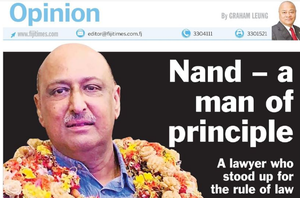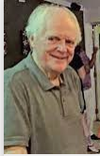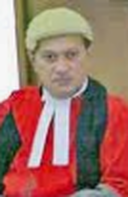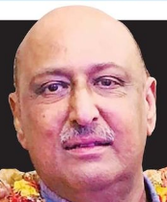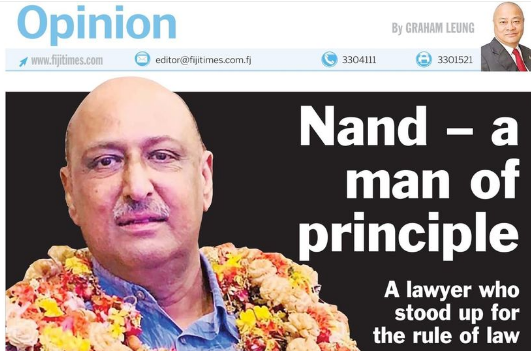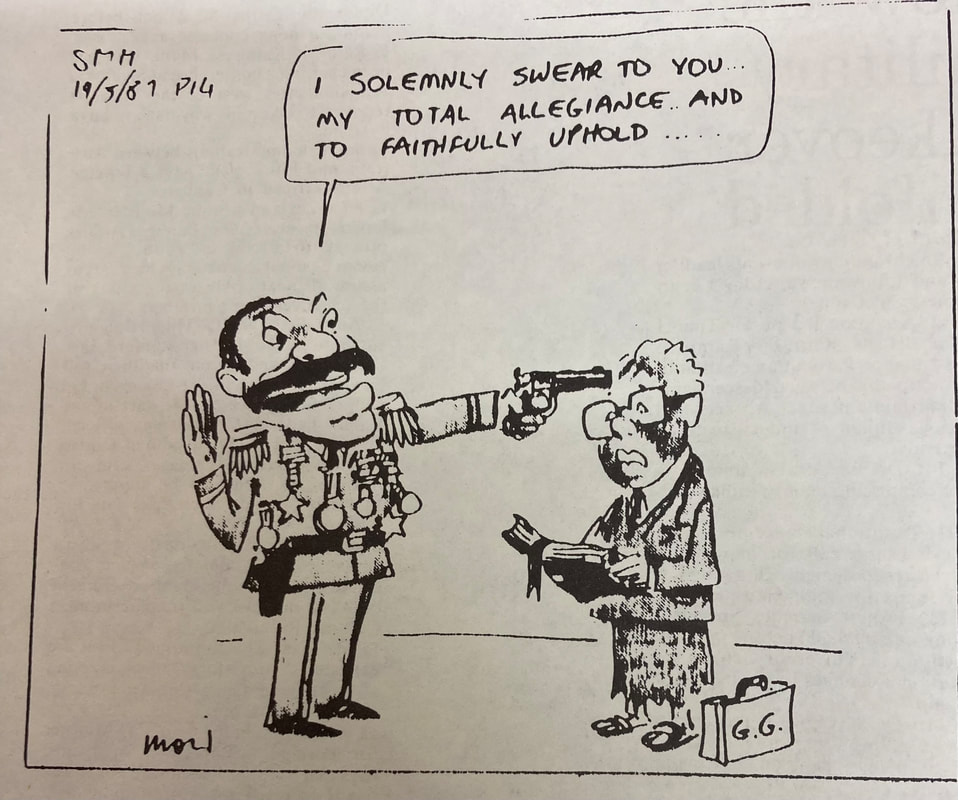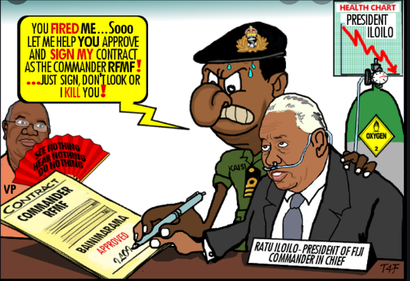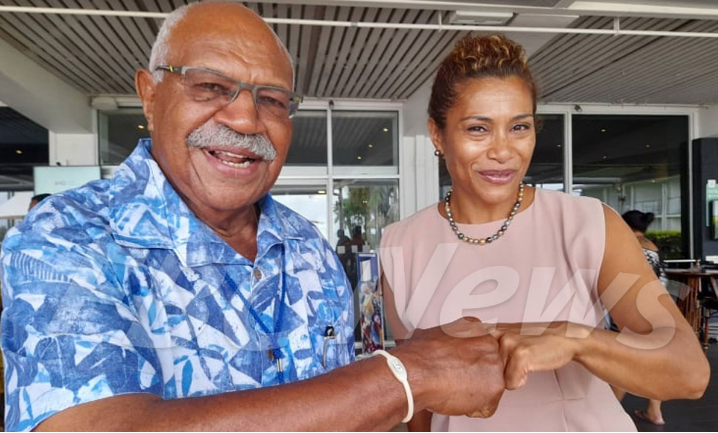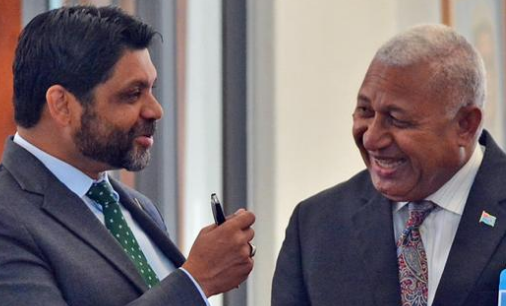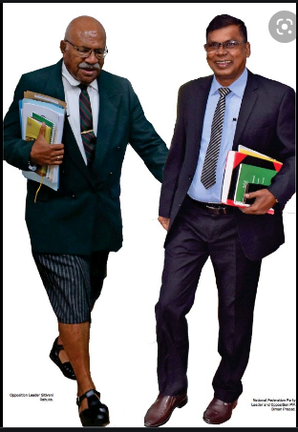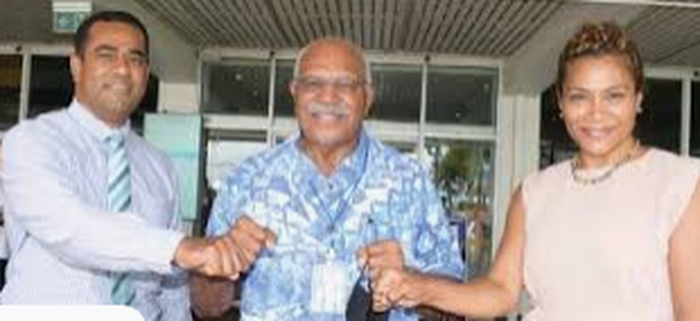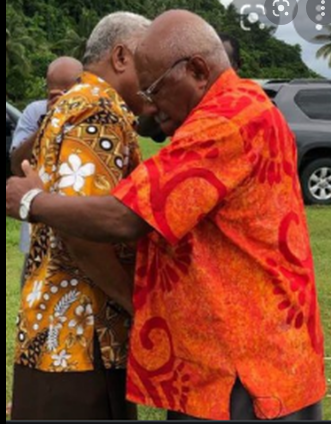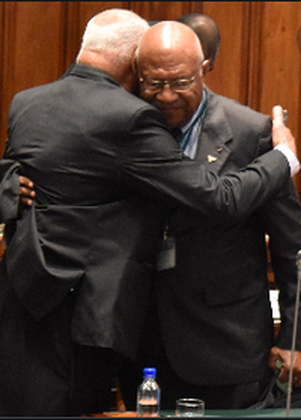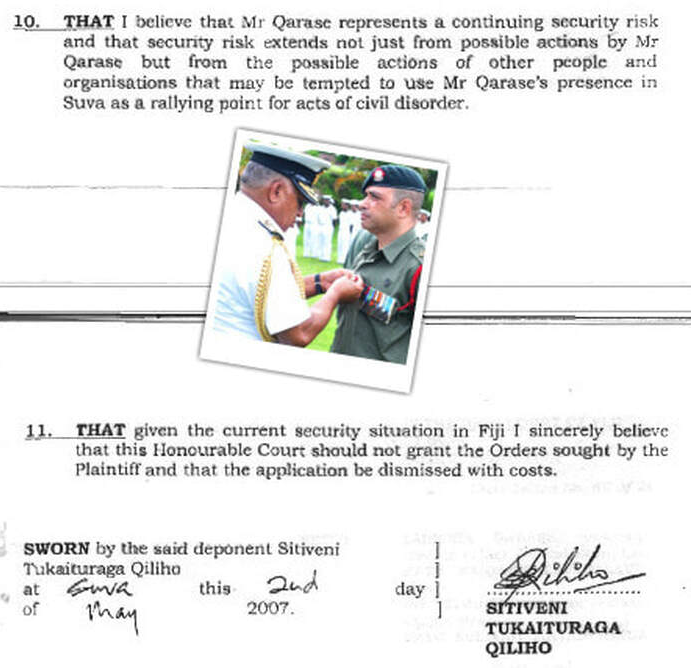The late Nand to Our Editor,
|
BEATING AT THE CAMP
|
United States Ambassador to Fiji, LARRY DINGER
|
The late Solicitor-General on former Chief Justice DANIEL FATIAKI's $275,000 golden handshake and the withdrawal of his (Fatiaki's) dismissal case as Chief Justice against the 2006 Coupists
"You will have to ask him (Fatiaki) that question. All I know is that he is the only one of us sacked who got the best deal. I did not get compensation even for 41 days leave which I had not taken. Such is life in Fiji."
Nand to our Editor, 28 July 2011
Suva lawyer GRAHAM LEUNG's admirable obituary piece in the Fiji Times, reproduced by NFP on its Facebook, on the late Solicitor-General Nainendra Nand omits to mention how he (Nand) was taken up to the military camp and beaten up by 2006 Coupist Frank Bainimarama. Bainimarama, just like his hugging partner and Coupist Sitiveni Rabuka, has never been brought to justice, for he is hiding behind Sitiveni Rabuka's 1988 Immunity in the 2013 Fiji Constitution. Sadly, or revoltingly, we have two prominent lawyers Lynda Tabuya and Filimoni Vosarogo singing praise for Rabuka's Peoples Alliance Party.
We won't be surprised if these two will present themselves as future Attorney-General and Solicitor-General in the 2022 election. We are also repeatedly informed that NFP's POSTER BOY RICHARD NAIDU is secretly negotiating a NFP-PAP Coalition pact with Rabuka. Has our good friend from the 1987 struggle, deposed Prime Minister Bavadra's press spokesman, forgotten that he was chased, beaten up and threatened to be put into a LOVO, and was later deported out of Fiji.
We are told that the late Nand, a lawyer, STOOD UP FOR RULE OF LAW
Cry The Beloved Country, as one Coup Victim after Another Passes Away
|
By GRAHAM LEUNG
THE death has occurred in Suva of Nainendra Nand, one of Fiji’s most senior lawyers. The former Solicitor-General died suddenly last Friday, aged 63. News of his passing was greeted with shock and sadness by his many colleagues and friends in the legal profession. Mr Nand was educated in the United Kingdom. |
After receiving his law degree from the University of North London, he went on to complete an LLM from the University of London. He was later called to the Bar at Lincoln’s Inn, founded in 1422, one of the four Inns of Court in London, to which barristers of England and Wales belong. He started work as a legal officer in the Crown Law Office in Suva following a brief stint with the firm G.P. Lala and Associates. He and I were colleagues in that office, he joining in 1982, and I, a year later.
The son of school teachers who had migrated to the United Kingdom, he had an air of authority and discipline which mirrored his strict upbringing. His no nonsense attitude was a product of his background. Mr Nand quickly developed a reputation for being a good and meticulous researcher. Early in his legal career he showed great promise as a barrister and was soon taking on major cases in the High Court representing the state. He was to become a confident and competent barrister who won the respect of the bench and the Bar.
That confidence was occasionally perceived as pomposity by some colleagues. Combined with a sharp tongue and a ready wit, he was sometimes mistaken for being arrogant. But deep down he was down to earth and unassuming. As a senior government lawyer he was responsible for grooming fresh off the plane law graduates who had won government scholarships to study law overseas. He took to this role like a duck to water, his “school masterly” manner often the butt of good natured jokes. His contemporaries in government legal service at the time included Gracie Fong, Apisalome Rabo, Alipate Qetaki, Ratu Joni Madraiwiwi, Imrana Jalal, Jon Apted, Sakiusa Rabuka, Walter Rigamoto and Savenaca Banuve, who all went on to become successful lawyers in their own right.
A career public servant, Mr Nand had a distinguished record in government service, rising through the ranks in the chambers of the Attorney-General. In 1997, he was promoted to be Solicitor-General, a position he held until December 2006 when a military coup shattered his 23- year legal career in government. Two days after the military seized power on the December 5, 2006, Mr Nand was dismissed from office for refusing to cooperate with the military junta. If he was disappointed by his shabby treatment, he showed his mettle by accepting his fate and moved on. He was not one to indulge in self-pity.
But he was devastated by the forcible undermining of the rule of law by yet another coup and despaired about the path that the country has taken. Mr Nand was the natural successor to the likes of Qoriniasi Bale, John Flower, and Filimone Jitoko who preceded him as Solicitor-General. As Solicitor-General, he was the chief executive officer for the offices of the Attorney-General, the Fiji Law Reform Commission and the Legal Aid Commission. He served on numerous government boards and committees including the Hotel and Guest Houses Licensing Board, the IKA Corporation, the Fiji Broadcasting Corporation, and the Maritime and Ports Authority of Fiji.
He was easily in the ranks of the country’s best public and administrative law specialists, his expertise in judicial review cases being widely acknowledged. His former boss and colleague Filimone Jitoko was generous in his praise of his successor. “Nainendra was quick to impress me with his discipline and decisive determination of any issues he was asked to provide legal opinions on and importantly, always provided on time in the six years we worked together. “He was to succeed me as the Solicitor-General a few years later, a much deserved reward for a model public servant imbued with industry and faithfulness. He was never afraid to offer unfavourable and contrary views to prevailing and popular interpretations of the law.”
Reminiscing about him, former Chief Justice Daniel Fatiaki said: “He was thoughtful and deliberative, not one to rush to conclusions and recognised his own limitations. He was always careful with his advice and his work was almost always correct in his assessments of the law and the strength of his cases.” Former High Court judge and colleague Gwen Phillips, who worked under Mr Nand, remembered him fondly. “There was not a corrupt bone in his body! That was the thing about Mr Nand – we trusted him. No hidden agendas? It was rare at the time and in our country,” she said.
Echoing Ms Phillips, senior lawyer Hamendra Nagin, who is the principal of Suva law firm Sherani, remembers Mr Nand as “ethical, hardworking and honest” and intellectually versatile. While his appearance of haughtiness could sometimes irritate colleagues, they respected and admired Mr Nand’s integrity, diligence and intellect. He was a stickler for punctuality and orderliness. This was reflected in his dress and demeanour – suave, well cut suits and ties with matching pocket squares. Following his dismissal from government in 2006, Mr Nand took up an appointment at USP, initially lecturing in commercial law and eventually being promoted to head of the law school. Scores of young lawyers will remember his gentle chiding in the courses he taught.
Mr Nand played a critical role in the development of the Professional Legal Training programs (PLT) at the USP law school, and in June 2021 was appointed the director of the program. He was the acting head of the School of Law in 2020. Over the past six years he was responsible for strengthening practical legal training in the Solomon Islands, Samoa and Vanuatu. A USP colleague Nancy Tikoisuva said: “The most significant characteristic I found in him was his generosity, his knowledge, love of a good red wine and a healthy debate on topical issues. He was also very approachable despite his stern look, once he laughs or smiles or in good company, he is on a roll with his banter.”
A young lawyer Joeli Naivalu, who was one of his students said, “He was just full of knowledge and knew how to transcend that across all races and ages.” He was the co-author of a legal text, Judicial Review Applications in Fiji, and has published widely in various journals. A fanatical supporter of English football, Mr Nand loved nothing better in his spare time than his regular grog session with his close friends, many of whom were lawyers. In those sessions he would regale them with his many stories drawn from his long experience in the law and the people he had encountered. On the serious side, he was ready to offer a considered opinion on recently decided cases that had come before the courts.
Had he chosen to side with those who had removed the elected government, Mr Nand could have handpicked any legal job in government he wished, but being a man of principle, he was resolute in his opposition to the 2006 coup, indeed all of Fiji’s coups d’état. Mr Nand would wish to be remembered as a lawyer who stood up for the rule of law, and paid the ultimate price for doing so. He belonged to a diminishing generation of Fiji lawyers for whom the love of the law and justice transcends fame, power and material wealth. He is survived by his wife Vineeta (nee Maharaj), sister Yvonne, and mother Suriya who lives in London.
• GRAHAM LEUNG is a Suva lawyer and worked with Nainendra Nand in the Crown Law Office which later became known as the Attorney-General’s Chambers. The views expressed in this article are not necessarily those of The Fiji Times. Fijileaks: *Alipate Qetaki, mentioned by Leung, had been granted special powers by Sitiveni Rabuka to discharge the "functions and duties of Attorney-General" after the 1987 racially-motivated coups. Qetaki was also part of the legal team that had helped draft the 1990 racist Rabuka Constitution, disenfranchising Indo-Fijians and other non-iTaukei Fijians. It was under this Constitution that Rabuka and his lot looted the National Bank of Fiji. And USP lecturer Dr Anirudh Singh was abudcted and tortured for burning the 1990 Constitution.
The son of school teachers who had migrated to the United Kingdom, he had an air of authority and discipline which mirrored his strict upbringing. His no nonsense attitude was a product of his background. Mr Nand quickly developed a reputation for being a good and meticulous researcher. Early in his legal career he showed great promise as a barrister and was soon taking on major cases in the High Court representing the state. He was to become a confident and competent barrister who won the respect of the bench and the Bar.
That confidence was occasionally perceived as pomposity by some colleagues. Combined with a sharp tongue and a ready wit, he was sometimes mistaken for being arrogant. But deep down he was down to earth and unassuming. As a senior government lawyer he was responsible for grooming fresh off the plane law graduates who had won government scholarships to study law overseas. He took to this role like a duck to water, his “school masterly” manner often the butt of good natured jokes. His contemporaries in government legal service at the time included Gracie Fong, Apisalome Rabo, Alipate Qetaki, Ratu Joni Madraiwiwi, Imrana Jalal, Jon Apted, Sakiusa Rabuka, Walter Rigamoto and Savenaca Banuve, who all went on to become successful lawyers in their own right.
A career public servant, Mr Nand had a distinguished record in government service, rising through the ranks in the chambers of the Attorney-General. In 1997, he was promoted to be Solicitor-General, a position he held until December 2006 when a military coup shattered his 23- year legal career in government. Two days after the military seized power on the December 5, 2006, Mr Nand was dismissed from office for refusing to cooperate with the military junta. If he was disappointed by his shabby treatment, he showed his mettle by accepting his fate and moved on. He was not one to indulge in self-pity.
But he was devastated by the forcible undermining of the rule of law by yet another coup and despaired about the path that the country has taken. Mr Nand was the natural successor to the likes of Qoriniasi Bale, John Flower, and Filimone Jitoko who preceded him as Solicitor-General. As Solicitor-General, he was the chief executive officer for the offices of the Attorney-General, the Fiji Law Reform Commission and the Legal Aid Commission. He served on numerous government boards and committees including the Hotel and Guest Houses Licensing Board, the IKA Corporation, the Fiji Broadcasting Corporation, and the Maritime and Ports Authority of Fiji.
He was easily in the ranks of the country’s best public and administrative law specialists, his expertise in judicial review cases being widely acknowledged. His former boss and colleague Filimone Jitoko was generous in his praise of his successor. “Nainendra was quick to impress me with his discipline and decisive determination of any issues he was asked to provide legal opinions on and importantly, always provided on time in the six years we worked together. “He was to succeed me as the Solicitor-General a few years later, a much deserved reward for a model public servant imbued with industry and faithfulness. He was never afraid to offer unfavourable and contrary views to prevailing and popular interpretations of the law.”
Reminiscing about him, former Chief Justice Daniel Fatiaki said: “He was thoughtful and deliberative, not one to rush to conclusions and recognised his own limitations. He was always careful with his advice and his work was almost always correct in his assessments of the law and the strength of his cases.” Former High Court judge and colleague Gwen Phillips, who worked under Mr Nand, remembered him fondly. “There was not a corrupt bone in his body! That was the thing about Mr Nand – we trusted him. No hidden agendas? It was rare at the time and in our country,” she said.
Echoing Ms Phillips, senior lawyer Hamendra Nagin, who is the principal of Suva law firm Sherani, remembers Mr Nand as “ethical, hardworking and honest” and intellectually versatile. While his appearance of haughtiness could sometimes irritate colleagues, they respected and admired Mr Nand’s integrity, diligence and intellect. He was a stickler for punctuality and orderliness. This was reflected in his dress and demeanour – suave, well cut suits and ties with matching pocket squares. Following his dismissal from government in 2006, Mr Nand took up an appointment at USP, initially lecturing in commercial law and eventually being promoted to head of the law school. Scores of young lawyers will remember his gentle chiding in the courses he taught.
Mr Nand played a critical role in the development of the Professional Legal Training programs (PLT) at the USP law school, and in June 2021 was appointed the director of the program. He was the acting head of the School of Law in 2020. Over the past six years he was responsible for strengthening practical legal training in the Solomon Islands, Samoa and Vanuatu. A USP colleague Nancy Tikoisuva said: “The most significant characteristic I found in him was his generosity, his knowledge, love of a good red wine and a healthy debate on topical issues. He was also very approachable despite his stern look, once he laughs or smiles or in good company, he is on a roll with his banter.”
A young lawyer Joeli Naivalu, who was one of his students said, “He was just full of knowledge and knew how to transcend that across all races and ages.” He was the co-author of a legal text, Judicial Review Applications in Fiji, and has published widely in various journals. A fanatical supporter of English football, Mr Nand loved nothing better in his spare time than his regular grog session with his close friends, many of whom were lawyers. In those sessions he would regale them with his many stories drawn from his long experience in the law and the people he had encountered. On the serious side, he was ready to offer a considered opinion on recently decided cases that had come before the courts.
Had he chosen to side with those who had removed the elected government, Mr Nand could have handpicked any legal job in government he wished, but being a man of principle, he was resolute in his opposition to the 2006 coup, indeed all of Fiji’s coups d’état. Mr Nand would wish to be remembered as a lawyer who stood up for the rule of law, and paid the ultimate price for doing so. He belonged to a diminishing generation of Fiji lawyers for whom the love of the law and justice transcends fame, power and material wealth. He is survived by his wife Vineeta (nee Maharaj), sister Yvonne, and mother Suriya who lives in London.
• GRAHAM LEUNG is a Suva lawyer and worked with Nainendra Nand in the Crown Law Office which later became known as the Attorney-General’s Chambers. The views expressed in this article are not necessarily those of The Fiji Times. Fijileaks: *Alipate Qetaki, mentioned by Leung, had been granted special powers by Sitiveni Rabuka to discharge the "functions and duties of Attorney-General" after the 1987 racially-motivated coups. Qetaki was also part of the legal team that had helped draft the 1990 racist Rabuka Constitution, disenfranchising Indo-Fijians and other non-iTaukei Fijians. It was under this Constitution that Rabuka and his lot looted the National Bank of Fiji. And USP lecturer Dr Anirudh Singh was abudcted and tortured for burning the 1990 Constitution.
